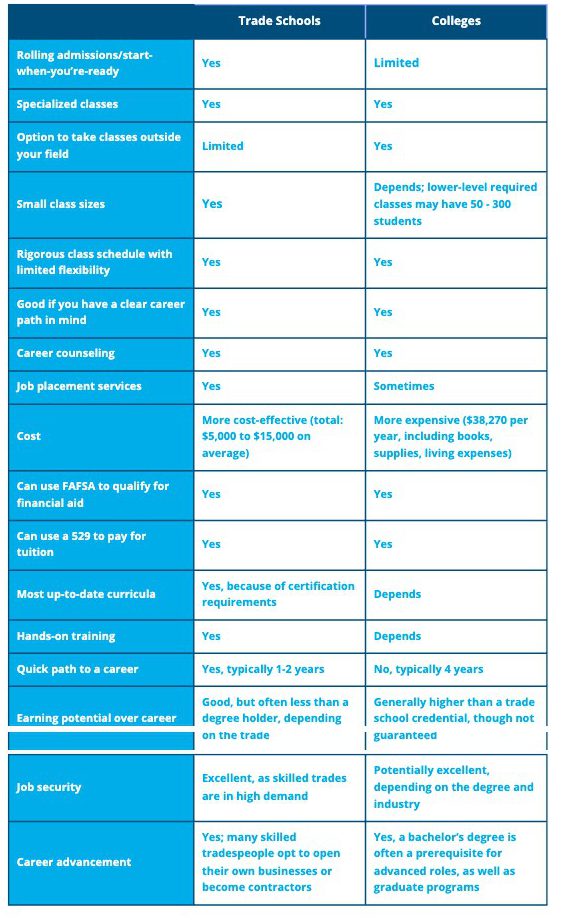
Trade School vs. College: Which path is right for you?
Posted by
Choosing between trade school and college is a pretty big decision for a high school student, as both paths offer distinct advantages and disadvantages. Here’s a breakdown to help you determine which might be the best fit.
Trade school
Also called vocational or technical schools, trade schools offer specialized, hands-on training for specific skilled occupations. Their programs and curricula are practical and job-specific, focused on preparing students directly for the workforce.
Key considerations
- Duration: Generally much shorter than traditional college, ranging from a few months to two years, facilitating quicker entry into a career.
- Cost: More affordable, with programs typically costing between $5,000 and $15,000, which can keep student debt more manageable.
- Career focus: Concentrates on practical skills for particular skilled trades (e.g., automotive repair, cosmetology, culinary arts, HVAC, nursing, plumbing, welding).
- Earning potential: Can offer competitive salaries, especially in high-demand trades. The return on investment (ROI) may be more immediate because you can start working sooner.
- Job security: Often high, as jobs in the skilled trades are frequently in demand.
- Career flexibility: Specialized skills may limit the ability to switch fields, though shorter training programs can make career changes less costly and time-consuming for anyone seeking additional training (or who wants to change industries entirely).
College or university
Higher education institutions offer two-year (associate) or four-year (bachelor’s) degrees across a broader range of subjects, like the arts, business, engineering, the humanities, or the sciences. Their curricula include education in a chosen major and additional coursework for a more comprehensive education.
Key considerations
- Duration: A longer commitment, typically two years for an associate degree (earned from a community college) or four years for a bachelor’s degree.
- Cost: Significantly more expensive than trade or technical school, with tuition ranging from $10,000 to $50,000 or more per year, potentially leading to substantial loan debt.
- Career focus: Provides a more extensive academic education and opens doors to more diverse career paths.
- Earning potential: College graduates can have higher earning potential over their lifetime.
- Job security: Generally strong, with a higher employment rate for college graduates than for those with only a high school diploma.
- Career flexibility: A broader education can offer more flexibility to change careers, although switching paths partway through (or after earning) a four-year degree can be expensive and time-consuming.
Which path should you choose?
Your path depends on your individual preferences, financial situation, long-term career goals, learning style, and what you love (or like enough to want to turn into a career).
Consider trade school if: You prefer hands-on learning, want or need to enter the workforce more quickly, are looking for a more affordable education, or gravitate toward a specific, high-demand skilled trade.
After a multi-year project to modernize the National Career Clusters Framework, the National Association for State Directors of Career Technical Education Consortium created 16 career clusters, subdivided into 79 career pathways, that trade school students can choose from. In other words, you have lots of options. A career in the skilled trades has far more opportunities than ever before.
Consider college if: You want a deeper college education, with the opportunity to study subjects that won’t necessarily be part of your career, want more diverse career options, or are seeking jobs that require a bachelor’s degree.
If variety is your spice of life, you have many different interests, and want to explore all you can, stretching your mind and intellect. Colleges and universities worldwide offer over 2,000 majors. In other words, there’s something for everyone. Still not sure? Check out our Guide to Pathways after High School for more inspiration.

Blog Categories
- Career Advice
- College Admissions
- Colleges & Universities
- Financial Aid and Scholarships
- For Counselors
- For Parents
- For Students
- Gap Years
- Mental Health and Wellness
- Online Learning
- Performing and Visual Arts
- STEM Majors and More
- Summer Programs
- Teen Volunteering
- Trade & Vocational Schools
- Tutoring & Test Prep

Organization with listings on TeenLife? Login here
Register for Free
We’re here to help you find your best-fit teen-centered academic and enrichment opportunities.
Forgot Password
"*" indicates required fields








